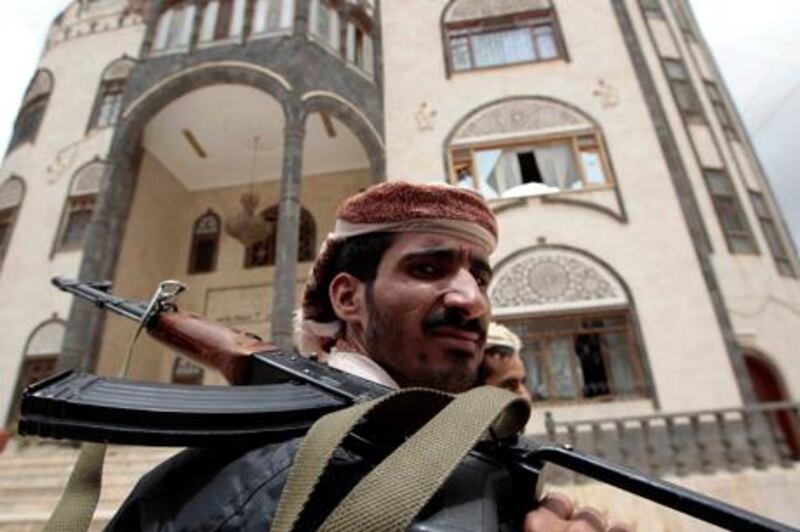SANA'A // Clashes spread across the capital yesterday between government forces and opposition militiamen from powerful tribes, threatening to engulf Yemen in civil war over the refusal by President Ali Abdullah Saleh to step down from power.
At least 74 people were killed in fighting yesterday that pitted US-trained uniformed soldiers and armed men in civilian clothes against the country's powerful Hashed tribe, led by Sadeq al Ahmar, according to government and opposition sources. The death toll included 28 people who perished in an explosion at an arms depot in the capital at dawn.
The thunder of exploding mortar shells and the pop of automatic weapons fire also sent residents fleeing the capital by the hundreds, their possessions hurriedly fastened to the roofs of their cars. Fighting continued near the international airport, which already had been closed briefly because of the clashes.
Meanwhile, the main political opposition coalition known as Joint Meeting Parties said in a statement yesterday that Yemenis should continue peaceful protests and Saleh and Ahmar fighters should end the fighting.
"In order to preserve the security and stability of Yemen, we demand president Saleh to stop fighting and respond to the public demands by stepping down immediately, today before tomorrow," the statement said.
The JMP urged Yemenis to avoid plunging the nation into civil war. The JMP is the political group that has been working with the Gulf Cooperation Council to broker a power-transfer agreement with Mr Saleh, who has refused on three occasions to sign the pact.
Massive rallies are expected today in several cities. The Yemeni clerics association has urged people to protest, considering it a religious duty.
The latest round of bloodshed began on Monday, after an attempt by government forces to storm al Ahmar's compound in the Hassaba neighbourhood in the heart of the capital. By yesterday, the clashes had widened to the neighbourhoods surrounding the compound, as well as areas near the airport.
Al Ahmar's forces have laid siege to at least nine government ministries and government troops have responded with mortars, shelling and rocket-propelled grenades. The targets yesterday included an important opposition mouthpiece, a TV station owned by al Ahmar, which was forced off the air by the attack. The fighting showed that the tribal fighters can hold their own against Mr Saleh's troops.
Civilians were being drawn into the maelstrom. Hundreds of houses close to Sheikh Ahmar's compounded were shelled, witnesses said. "My house was attacked and I lost everything I owned. Who should I blame? The government or the militants?" said Abdul Salam Wafi. There were also unverified reports that non-combatants were being used as human shields.
"I am leaving for Aden as life is becoming difficult in Sana'a," said Ali al Yafee as he was passing through a checkpoint south of the capital. "The fighting is intensifying and we have found our lives at risk."
Each side accused the other yesterday of escalating the violence, the worst since peaceful street demonstrations began three months ago, calling on Mr Saleh to leave office after 32 years in power.
Authorities ordered the arrest of Sheikh Ahmar and other Hashed tribal leaders, saying they were solely to blame for the violence. "They attacked governmental property. The law must treat all equally, whether a leader or a civilian," an official in the attorney general's office said.
Sheikh Ahmar challenged Mr Saleh to try to capture him. "I am standing strong in my house and will fight the oppressive regime of Saleh until victory," he said. "The tribes of Hashed dare anyone to come close" to the sheikh, said an aide, Abdul Qawi Qaisi.
Thousands of tribesmen from Amran province, the stronghold of the al Ahmar family, poured into the capital during the past three days. Republican Guards forces led by Mr Saleh's son, Ahmed, have tried to block all entrances to the city to prevent Sheikh Ahmar supporters from entering the capital.
"I am ready to sacrifice my life for our sheikh," said Hussein al Osaimi, a tribal militant. "The attack on his house is a big shame that we can not accept. Al Ahmar family was the main source of power of Saleh and now he is paying them back."
The sheikh, formerly a close ally of the president, warned that Mr Saleh had the option to step down or be held accountable for "dragging the country to a civil war."
He told reporters that while he was willing to agree to a cease-fire deal with Mr Saleh, he was doubtful any mediation would work with the Yemeni president. "No mediation works with Ali Abdullah Saleh, Ali Abdullah Saleh is a liar, liar, liar," he said. "We are firm. He will leave this country barefoot."
The latest fighting poses the most significant challenge yet to Mr Saleh's rule after three months of street demonstrations and failed mediation by the Gulf Cooperation Council to ease him from office. Yemen's tribes command well-armed militias and can tap into traditional clan-based loyalties to possibly tips the scales against Mr Saleh's rule.
Under Yemen's ancient codes, tribal leaders can declare that members follow their orders above all others. This potentially gives tribal chiefs the power to order government soldiers from their clans to stand down.
Amid the clashes, youth protesters worked frantically to organise a demonstration for today, calling it the "Friday of peaceful revolution."
"We want to assure the international community that our revolution started peacefully and will end peacefully," said Riyadh al Hada, a protest organiser.
"The clashes are between Saleh and Hashed and not the Yemeni revolution," he said.
* With additional reporting by Mohammed al Qadhi from Taiz and the Associated Press





